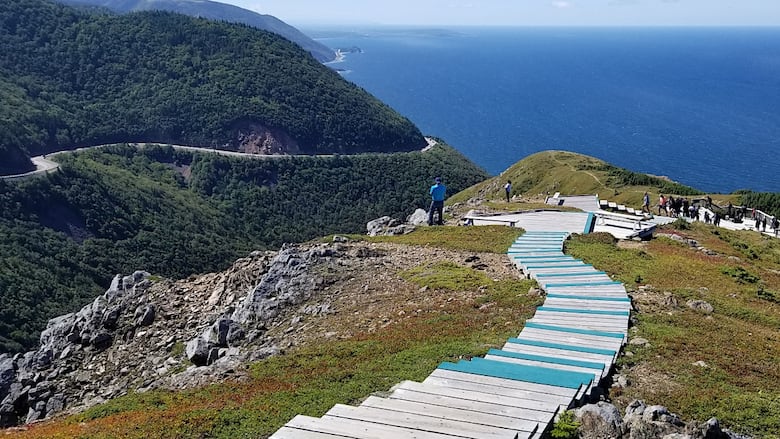N.S. tourists, operators pivoting amid drought-driven ban on forest activities
Ban will be in place until Oct. 15, or until conditions improve

Some tourism operators and people visiting Nova Scotia have been left scrambling to change their plans after the provincial government imposed a ban on activities in the woods earlier this week, shutting down trails and parks at one of the busiest times of the year.
The province has been experiencing moderate-to-severe drought conditions, prompting a ban on open fires and activities in the woods such as hiking, camping, fishing and driving ATVs. Camping is still allowed at campgrounds.
Lee Fraser of Live Life in Tents, an adventure company that offers an array of activities such as camping and hiking tours along the world-famous Cabot Trail in Cape Breton, said they were blindsided by the ban.
They were forced to cancel a four-day, three-night guided hike of the picturesque seawall trail that was booked one year ago.
"It's the hiking trails that people come here to do," said Fraser. "It's hard to tell people that come here who are excited to go hiking that, yeah, the woods are cancelled."
Fraser said they have been in "crisis mode" since the announcement on Tuesday, fielding cancellations and explaining to their customers that camping and activities on the nearby Margaree River are still on.

He expects his company's river offerings, like tubing and kayaking, might see a boost while the ban is on. But there are still many unknowns, said Fraser.
He said the government should have better communicated its plan with people in the industry.
"We like to have a full calendar, but who knows what's going to happen," said Fraser.
"Whether or not they have other activities to do, they're going to start cancelling trips and not coming to the island.... People are going to shift based on the limitations of not being able to hike."

Cheryl and Todd Allie travelled from Orlando, Fla., to hike the iconic Skyline Trail. But they're still making the best of their trip to Cape Breton.
"It's a shame that it's closed, but we certainly understand why," said Todd Allie, adding that they now plan to hit up the beaches and visit a golf course.
"The Cabot Trail and the park are just so beautiful just to drive through and do the scenic overviews so I can't complain too much."
Lynn Esposito from St. Marys, Ga., said she was "very disappointed."
"You get so excited about your trip and you start planning what you want to do and then when you get here, you can't do it," she said, with her husband, Mike Esposito.
Meanwhile in Truro, N.S., visitors to the town's 1,200-hectare park said they were surprised by the ban, but also understanding of it.
Cristin Murphy is from Jasper, Alta., where a wildfire broke out last July, destroying 358 of the town's 1,113 structures.
"If there's any kind of precautions you can take, I fully support that," Murphy said in Victoria Park. "We'll play at the playground and check out the pool and the splash park."

The new measures will be in place until Oct. 15, or until conditions allow them to be lifted.
The fine for violating the ban is $25,000. Agencies in the province have issued 10 tickets worth that amount so far this year.
All fireworks, including consumer and display fireworks and pyrotechnic special effects, are also banned, even if they have the appropriate approvals.
The province said people with questions about the woods restrictions can call their local Natural Resources Department office.
Previous bans in 2023, 2016 and 2001
This is not the first time wooded areas of the province have been shut down to the public.
Travel and activity in the woods was also banned in May 2023 while the province battled two major wildfires that destroyed hundreds of homes.
The restrictions were initially put in place for about four weeks or until conditions allowed them to be lifted, which happened after about a week.
Bans were also implemented in 2016 and 2001 due to fires and dry conditions.
With files from Anna Rak, Luke Ettinger

